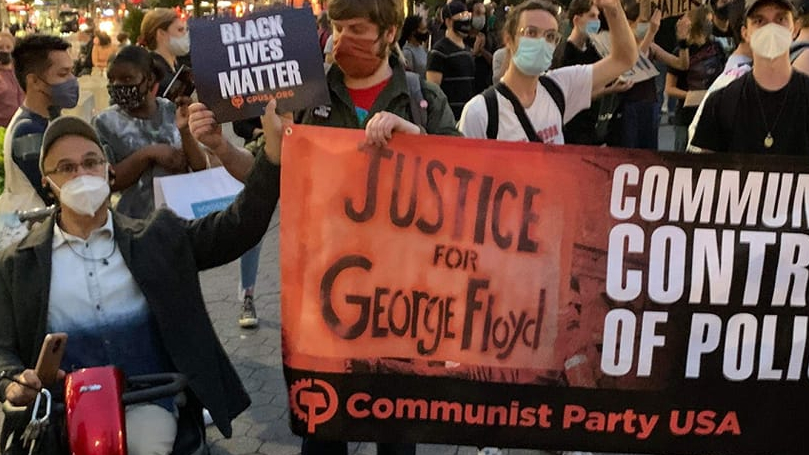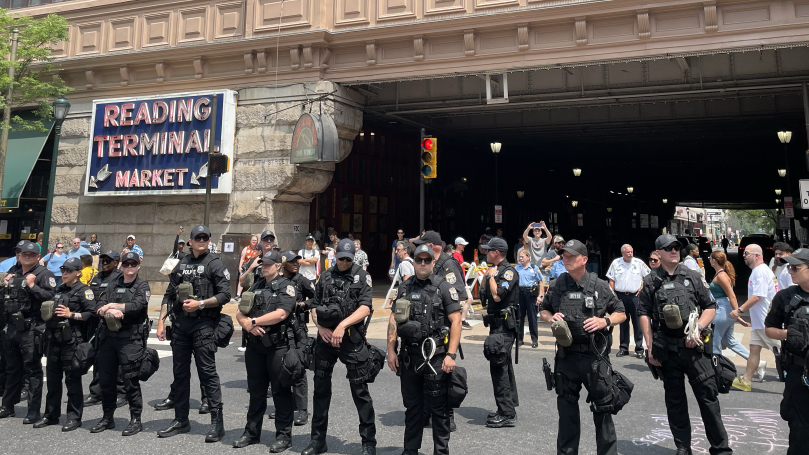
This piece is a contribution to the Pre-Convention Discussion for our 32nd National Convention. During Pre-Convention Discussion, all aspects of the party’s program, strategy, and tactics are up for consideration and debate. The ideas presented here are those of the author or authors alone, and do not necessarily reflect the positions of the Communist Party USA, its membership, or their elected leadership bodies. — Editors
Since the advent of capitalism, there have always been forms of police to defend the interests of the bourgeoisie. The institution of policing, as it evolved in the United States, is explicitly linked to its origins as enforcers for the land-owning class. In particular, police were organized around protecting the system of enslavement, a role that was always present but became particularly visible after the Fugitive Slave Act tasked U.S Marshals with tracking down and returning those who escaped enslavement.
History of community control of the police
The fight for community control of the police then had its origins as early as the Reconstruction period. In the years following the Civil War, enfranchised Black communities elected sheriffs and marshalls in their districts. These democratically elected officers provided protection to their communities from the KKK and other forms of white supremacy. Described by W.E.B Du Bois in Black Reconstruction as an era of “abolition democracy,” the Reconstruction period was an unprecedented time of Black radical organization, one that was brutally crushed by white supremacy and racist violence after the withdrawal of Union forces from the South in 1877. Political and economic power was stripped from Black communities, and with it, control over the police returned to the white-supremacist ruling class. As demonstrated by centuries of brutalization, repression, and violence, the only thing that police stand to serve and protect are the wealthy and their interests.
In the 1960s, the Black Panther Party included community control over the police in their party platform. In 1969, a “Community Control of Police” referendum was placed on the local ballot in Berkeley California, in which the Black Panthers demanded both the development of a community oversight board and the people’s right to elect police commissioners. Reflecting on this campaign and the concept of community control, co-founder of the Black Panther Party Bobby Seale said, “The concept of greater control by the people and community of their police department is a constitutional democratic necessity.” The referendum lost by only 1% of the vote. However, this was not the end of the fight. The Black Lives Matter movement has consistently called for the deconstruction of the police state and for control over policing to be transferred into community hands. Organizations like The National Alliance Against Racist and Political Repression (NAARPR), as well as the Pan-African Community Action (PACA) have been staunch leaders in advocating for community control of police in the past decade. The need for community control of the police becomes more urgent by the day.

Community control of the police today
In the wake of several murders at the hands of police during the first peak of the COVID-19 pandemic —most high profile among them those of George Floyd in Minneapolis, Minnesota and Breonna Taylor in Louisville, Kentucky — a popular movement for change erupted across the U.S. and the world. In response to this, U.S. institutions produced piecemeal resolutions and crass political stunts as well as more-serious attempts to produce greater levels of accountability from police.
While working people called for police reform, police defunding, or police abolition, response from governments across the country emphasized “community policing” (historically defined as vague collaboration between the police and community) and the more tangible solution of civilian oversight commissions and committees. It is the hope that such committees, led by non-police and not tied to institutional politics, can positively affect how police act toward the citizens. These responses do not, however, implement democratic community control of the police.
The movement for greater police accountability that leads to civilian control over police is widespread across the country. In Minneapolis, a policing plan overhaul was put in place in 2023, after a state investigation found a decade-long pattern of discriminatory practices in 2022, leading to the establishment of an oversight committee later that year. In Chicago, where concerns about police abuses included a secret interrogation site in the mid-2010s, two bodies were created through a 2021 ordinance, the Community Commission for Public Safety and Accountability, and District Councils democratically elected in each police district “to improve policing and public safety in the district.”
In Philadelphia, the Citizens Police Oversight Commission (CPOC) was formed in 2022, after a ballot measure calling for its creation was approved by 79% and Philadelphia City Council voted for its creation 16-1. Positive results from this commission have been curtailed by limited power and, as of last year, alleged dysfunction and possible financial impropriety. CPOC is tasked with observing, analyzing and giving recommendations on police conduct. The Commission has approximately 0.3% of the budget and 0.3% of the staff of the Philadelphia Police Department. They hold “Know Your Rights Panels” and monitor police behavior at protests. The Philadelphia CPOC also participates in the Interagency Civil Rights Task Force and has connections with national police oversight organizations.
Unfortunately, we can see that these efforts have not gone far enough. Police across the U.S. killed at least 1,232 people in 2023, the highest number since nonprofit research group Mapping Police Violence began recording the data in 2013. This in a year where homicides overall decreased by roughly 13% from 2022, the biggest drop on record. In Philadelphia, CPOC’s work can be described as “far from done,” judging from their 2021-2023 Combined Annual Report. Complaints about PPD officers still take over a year to resolve. CPOC faces barriers like PPD policy allowing 72 hours for any officer who fired their gun to give a statement; three whole days before divulging why they were provoked to shoot at someone.
This leaves room for the sort of inconsistencies seen in the case of Eddie Irizarry, about whose murder the police changed their story between his death on August 14, 2023 and the following day .The institutional deference to the police is also exemplified in the legal proceedings that followed. On September 8, the former officer Mark Dial had all charges in his case (first-degree murder, voluntary manslaughter, aggravated assault, simple assault, reckless endangerment, and official oppression) dismissed by Municipal Court Judge Wendy L. Pew despite camera footage showing he acted in the wrong. All charges were reinstated in October.
Future of community control of the police
 In many ways the history of Black liberation has been a struggle to obtain democratic community control of all facets of their own lives. In essence, self-determination. On paper, this is a principle that the United States proclaims to support. For a community’s public safety department to be representative they at minimum must be accountable to the public. Philadelphians don’t just deserve accountability when an officer abuses their power, they deserve to be able to shape the norms and practices of public safety so that these abuses do not happen in the first place. The people need to have hiring and firing power over the police, and final say over all policing policies.
In many ways the history of Black liberation has been a struggle to obtain democratic community control of all facets of their own lives. In essence, self-determination. On paper, this is a principle that the United States proclaims to support. For a community’s public safety department to be representative they at minimum must be accountable to the public. Philadelphians don’t just deserve accountability when an officer abuses their power, they deserve to be able to shape the norms and practices of public safety so that these abuses do not happen in the first place. The people need to have hiring and firing power over the police, and final say over all policing policies.
We have seen that CPOC in its current form is inadequate at preventing police misconduct. This is sadly not new, as Philadelphia has attempted civilian review boards as far back as 1958. The failings of these boards is due in part to the fact that, while police departments don’t determine government policy, they do control the norms and priorities of their enforcement. Community control is about giving communities democratic control of the norms, priorities and enforcement over public safety in their neighborhoods. The CPOC cannot just be able to review and provide advice, it must have legal authority to enforce the democratic will of the people. To accomplish this, we are calling for directly-elected all-civilian councils in every police jurisdiction that have:
- Final authority over police policy, oversight policy, and budget, including writing and reviewing
- Full authority on disciplinary measures and legal recourse, including subpoena power and the convening of grand juries
- Hiring and firing power over the police chief or superintendent, all officers on the force, the head of any existing oversight or review boards and offices, and the members of those
- Full access to all investigations by the oversight or review institutions
- Authority to broaden the scope of investigations to include all allegations of misconduct, including sexual assault
- Oversight of negotiation of police union contracts
- Authority to exclude all current and former law enforcement agents from serving on the board
These policy proposals represent the fundamental shift of power the people need to ensure that systematic police brutality and mass incarceration can one day become a distant memory of an antiquated time just like Jim Crow and chattel slavery.
To bring about community control of the police would require a mass mobilization that recalls the popular movement for police and justice reform that arose following the killing of George Floyd, a mass mobilization that incorporates a broad array of community, faith, and labor organizations to develop power rooted in those communities. Many organizations are already engaged in issues of criminal justice reform and public safety. We must unite our movements and wield our collective strength to effectively define and control how our communities are served and kept safe.


 Join Now
Join Now